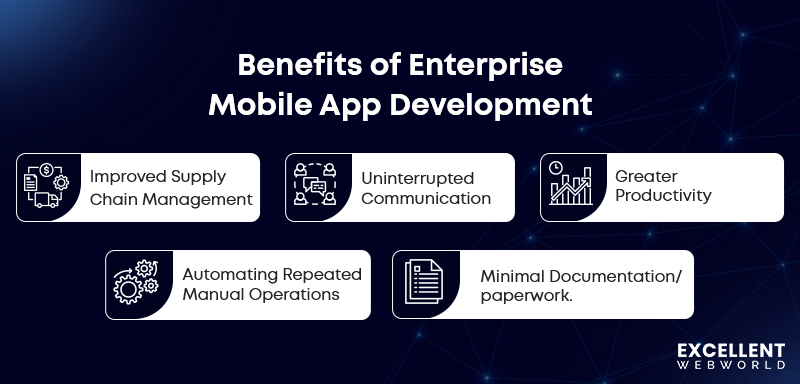Why is enterprise mobile application development turning into a top priority for companies? The answer is simple: businesses want speed, efficiency, and more innovative ways to work. Global leaders are already building enterprise applications to manage operations, improve communication, and empower employees on any device.
Mobile enterprise applications are no longer just tools; they’re the backbone of modern business. With AI-driven insights, cloud-powered systems, and advanced security, these apps allow teams to work faster and make better decisions anywhere, anytime.
The opportunity is clear: investing in enterprise mobility now means staying ahead, driving innovation, and building a stronger digital future.
What Exactly is Enterprise Mobile App Development?
Enterprise mobile application development is the process of creating mobile apps designed specifically for businesses. Unlike regular apps you download for personal use, these are built to solve workplace challenges, whether it’s managing data, improving workflows, or connecting employees across different locations.
In enterprise app development, the focus isn’t just on features but also on scalability, security, and integration with existing business systems like CRM or ERP. That’s what makes it different from regular consumer apps, which mainly focus on user entertainment or everyday convenience.
Businesses invest in enterprise application development because it helps them streamline operations, improve decision-making, and keep teams connected in real time. In today’s digital-first world, having a mobile enterprise app isn’t just an option; it’s a competitive necessity.
What Are the Latest Market Trends in Enterprise Mobile App Development (2026)?
The growth is massive. The global enterprise mobile app market is valued at USD 168.45 billion in 2025, and it’s expected to reach USD 303.56 billion by 2030, expanding at a strong 12.5% CAGR.
One major app development trend is the rise of cloud-powered mobile enterprise applications. Businesses want apps that are accessible anywhere, secure, and easy to scale. At the same time, AI and IoT are reshaping how companies build enterprise applications, enabling automation, predictive analytics, and smarter workflows.
Another big driver is remote work. As teams become more distributed, enterprise app development focuses on collaboration tools, real-time data access, and stronger security. The trend is clear—future-ready enterprises are betting big on mobile-first solutions.
What Types of Enterprise Mobile Applications Exist?
In enterprise mobile application development, not all apps serve the same purpose. Depending on business needs, mobile enterprise applications are usually grouped into three main types.
1. Employee-level apps
These apps are designed for individuals within the company. They simplify daily tasks like attendance tracking, project updates, or accessing internal resources.
2. Department-level apps
Here, the focus is on helping specific teams work better. For example, HR apps manage recruitment, finance apps handle expenses, and sales apps track leads. This type of enterprise app development reduces silos and improves collaboration.
3. Business-level apps
These are large-scale solutions that connect the entire organization. They integrate multiple departments, giving leaders real-time visibility into operations and performance.
Some real-world examples of enterprise applications include Salesforce for customer management, SAP for resource planning, and Slack for team communication. Each shows how enterprises build apps to meet unique goals.
What Are the Benefits of Enterprise Mobile Application Development?
Businesses today rely heavily on enterprise mobile application development because it brings both efficiency and scalability. By adopting mobile enterprise applications, companies can streamline operations and create more value across departments. These solutions also highlight clear app benefits for business, making them essential in today’s competitive market.
Here are some key benefits of enterprise mobile application development:
1. Automation of manual work
Repetitive tasks like data entry, approvals, or reporting can be automated. This reduces human errors and saves valuable time through smart enterprise applications development.
2. Boosting productivity
When employees have mobile access to business tools, collaboration becomes seamless. Enterprise app development ensures teams stay connected, whether in the office or working remotely.
3. Real-time data access
Instant analytics help managers make faster, data-driven decisions. With technologies like AI in mobile app development, companies can get predictive insights instead of just static reports.
4. Better supply chain & workflows
From tracking inventory to optimizing delivery routes, mobile enterprise applications keep supply chains smooth. Adding AI integration into an app can further enhance forecasting and resource management.
5. Cost savings
By minimizing paperwork, reducing manual errors, and optimizing processes, businesses cut down on operational costs while improving performance.
In short, enterprise mobile application development is not just about building apps, it’s about creating smarter systems that drive long-term growth.
How Are Enterprise Mobile Applications Used in Different Industries?
Enterprise mobile application development helps businesses work faster and smarter in every industry. Mobile enterprise applications give instant insights, streamline operations, and make it easier for teams to make informed decisions.
1. Healthcare
Hospitals and clinics use apps to manage patient records, appointments, and staff coordination. With healthcare app development, medical teams can provide faster care and track critical data in real time.
2. Retail
Retailers leverage mobile apps to manage inventory, track sales, and engage customers. Integrating AI in retail helps predict demand, personalize offers, and optimize the shopping experience.
3. Logistics
Fleet management, warehouse tracking, and delivery monitoring become simpler with IoT in logistics. These enterprise application development solutions ensure supply chains run smoothly and efficiently.
4. Finance
Banks and financial institutions use apps for secure transactions, loan processing, and account management. Fintech app development allows enterprises to provide seamless mobile services while keeping data safe.
5. Manufacturing
Mobile apps track production lines, manage resources, and monitor equipment. Enterprise app development in manufacturing improves operational efficiency and reduces downtime.
Across industries, enterprise mobile applications are no longer optional; they’re essential for modern business operations.
What Features Should an Enterprise Mobile App Have?
In enterprise mobile application development, the right features make all the difference. Mobile enterprise applications need to be secure, fast, and easy to use while supporting business goals. Here are the key features every enterprise app should have:
1. Security & Compliance
Protecting sensitive data is critical. Enterprise app development focuses on encryption, user authentication, and compliance with industry standards.
2. Analytics & Reporting
Real-time insights help managers make informed decisions. Enterprise application development often includes dashboards, KPI tracking, and advanced reporting tools.
3. Cloud Integration
Cloud-connected apps allow teams to access information anytime, anywhere. It also ensures smooth collaboration and easy data backups.
4. Push Notifications
Instant alerts keep employees updated on tasks, approvals, or important updates, improving workflow efficiency.
5. Offline Access & Scalability
Apps should work even without internet and be able to grow with your business. Scalability ensures the solution remains effective as teams and operations expand.
With these features, enterprise mobile applications become powerful tools that drive productivity, collaboration, and smarter decision-making.
What Challenges Do Businesses Face in Enterprise Mobile App Development?
Building strong enterprise mobile applications is not always easy. Companies often face roadblocks during enterprise app development, but the good news is most of these challenges have practical solutions.
1. Data Security
Challenge: Protecting sensitive business data is a top concern.
Solution: Strong encryption, role-based access, and compliance checks are must-haves in enterprise applications development.
2. Legacy System Integration
Challenge: Many businesses still run on outdated software.
Solution: Modern APIs and middleware make it easier to connect legacy tools with new mobile enterprise applications.
3. Development Costs
Challenge: Custom apps can feel expensive upfront.
Solution: Start small, define clear goals, and scale features over time to optimize costs in enterprise mobile application development.
4. Employee Adoption
Challenge: Even the best app fails if employees don’t use it.
Solution: Simple UI/UX, proper training, and feedback loops help drive adoption of enterprise mobile applications.
Overcoming these challenges ensures your enterprise app development efforts actually deliver value—both for employees and for the business.
What Should You Consider Before Launching an Enterprise Mobile Application?
Before you start enterprise mobile application development, careful planning is key. Considering the right factors ensures your mobile enterprise applications are successful, scalable, and cost-effective.
1. Business Goals
Clearly define what you want to achieve. Knowing your objectives guides enterprise app development and ensures the app supports overall business strategy.
2. Budget Planning
Set a realistic budget for design, development, and ongoing updates. Smart financial planning keeps enterprise applications development on track without surprises.
3. Platform Selection
Decide whether to focus on iOS, Android, or both. Choosing the right platform is essential in mobile enterprise app development to reach your target users efficiently.
4. Scalability
Plan for growth from the start. Your app should handle more users, features, and data as your business expands. This is crucial in enterprise mobile apps development.
5. Post-Launch Maintenance
Apps need regular updates, bug fixes, and performance checks. Continuous support ensures that your developing enterprise applications remain reliable and effective over time.
By keeping these points in mind, businesses can successfully build enterprise applications that are secure, efficient, and ready to support long-term growth.
What Technologies and Platforms Are Best for Enterprise Mobile Apps?
Choosing the right technology is crucial in enterprise mobile application development. The right platform and tools can make your mobile enterprise applications more efficient, scalable, and future-proof.
1. Native vs Cross-Platform
Native apps are built specifically for iOS or Android, offering top performance and full access to device features. Cross-platform tools like Flutter or React Native let you build enterprise applications that run on multiple devices with a single codebase, saving time and cost.
2. Backend & Cloud Platforms
Cloud platforms such as AWS, Azure, or Google Cloud support secure data storage, real-time updates, and seamless collaboration. Integrating these platforms is key for enterprise applications development that scales with your business.
3. AI/ML Tools
Incorporating AI and machine learning helps automate processes, provide insights, and enhance decision-making. Enterprise app development with AI capabilities can boost productivity and improve operational efficiency.
4. Low-Code/No-Code Options
For faster deployment, low-code and no-code platforms allow teams to develop enterprise applications without heavy coding. This approach speeds up enterprise mobile apps development and makes updates easier.
Selecting the right combination of app development technologies ensures your mobile enterprise app development is robust, flexible, and ready to meet your business goals.
What Are the 9 Stages of Enterprise Mobile App Development?
Like most digital projects, mobile app development for enterprise may look complicated at first. But if you break it down, the enterprise mobile app development process follows the same standard steps as any other app. With the support of an experienced company like Excellent WebWorld, enterprise mobile application development becomes smooth and stress-free. Here are the key steps:
1. Define the Business Objectives to Develop an Enterprise Mobile App
Start by defining the purpose and must-have features. Clear goals make building enterprise applications faster and more organized, saving both time and effort.
2. Estimate the Budget for Enterprise Applications Development
Decide how much you’re ready to invest. The cost of enterprise applications development depends on complexity, features, and scalability.
3. Write the Technical Specifications for Enterprise App Development
Your enterprise app developer will prepare a roadmap. This includes the tech stack, development platforms, wireframes, and other technical details needed for developing enterprise applications.
4. Choose the Right OS for Mobile Enterprise App Development
Choose whether the app will be for Android, iOS, hybrid, or both. Platform selection is crucial in mobile enterprise app development to maximize reach.
5. Build a Prototype to Test Enterprise Applications Early
Create a prototype with core features. This stage helps test ideas early, saving money and avoiding rework during enterprise app development.
6. Design the UI/UX for Better Adoption of Enterprise Mobile Apps
A user-friendly design is critical. Good UI/UX ensures employees adopt the app quickly, which is a must in enterprise mobile apps development.
7. Develop the Final Enterprise Mobile Application
This is where coding happens. Skilled enterprise app developers create secure, scalable, and functional apps tailored to your organization.
8. Test the Enterprise Mobile App for Performance and Security
Before launch, test everything—features, performance, and security. Rigorous QA ensures the mobile enterprise applications are ready for real-world use.
9. Support and Maintenance for Enterprise Applications Development
The journey doesn’t end at launch. Ongoing updates, bug fixes, and monitoring are essential in enterprise mobile application development to keep the app optimized and future-ready.
How Do Enterprise Apps Differ From Consumer Apps?
At first glance, apps look similar. But enterprise mobile application development is very different from building consumer apps. Here’s how they differ:
1. Purpose
Consumer apps focus on entertainment, shopping, or social use. Enterprise apps are built to solve business problems, streamline workflows, and improve productivity.
2. Security
Enterprise apps handle sensitive company data, so strong encryption, compliance, and role-based access are critical. Consumer apps usually have lighter security needs.
3. User Base
Consumer apps serve the general public. Enterprise apps are designed for employees, managers, and partners within an organization.
4. Cost & Complexity
Enterprise apps are more complex. They require integration with legacy systems, cloud services, and analytics tools, making enterprise app development more expensive than a typical consumer app.
In short, while consumer apps focus on customer experience, enterprise mobile apps development is about efficiency, control, and scalability for businesses.
How Much Does It Cost to Build an Enterprise Mobile App in 2026?
When it comes to enterprise mobile app development cost, one of the first questions businesses ask is: “How much will it cost to build an enterprise app in 2026?” The truth is, there’s no one-size-fits-all answer.
1. Cost Factors
The cost of building enterprise applications depends on:
2. Average Cost Ranges
| App Type | Estimated Cost (USD) | Examples / Features |
|---|---|---|
| Simple Enterprise App | 20k – 40k | Basic dashboard, limited integrations |
| Mid-Level Enterprise App | 40k – 90k | APIs, analytics, moderate UI/UX |
| Complex Enterprise App | 90k+ | AI/ML, real-time data, cloud + high security |
3. Cost Optimization Tips
In short, the cost of enterprise app development in 2026 depends on your app’s scope and technology, but smart choices can help you balance quality and budget.
Why Choose Excellent Webworld for Enterprise Mobile App Development?
Enterprise mobile apps are no longer a luxury, they’re a must-have for businesses aiming to boost productivity, streamline operations, and stay ahead of competition. The cost of enterprise app development can feel overwhelming if done wrong, but with the right partner, it becomes an investment that drives long-term growth.
At Excellent Webworld, we bring over a decade of expertise as an app development company. Our team ensures your systems are tested thoroughly, keeping your infrastructure secure, compliant, and ready for anything.
Over 13 years of experience in various industries, our team of experts has successfully developed high-performance application that integrate advanced AI technologies. With more than 900 successful projects, our experts have catered to different client needs in various industries
Got an idea? Let’s bring it to life—book your free consultation today.
FAQs on Enterprise Mobile Application Development
To develop enterprise applications, start by defining your business goals. Then plan features, choose the right platform (iOS, Android, or cross-platform), design the UI/UX, and hire an experienced enterprise app developer or enterprise mobile apps development company. Finally, build, test, and maintain the app for smooth operations.
Enterprise applications examples include tools like Salesforce, SAP, Slack, Microsoft Teams, and custom internal apps. These apps help businesses manage data, workflows, teams, and communication efficiently.
Enterprise mobile application development trends in 2026 include:
Yes. Mobile enterprise applications improve productivity, streamline workflows, and reduce costs. They help employees access data anytime, automate processes, and make informed decisions, making enterprise app development a smart investment.
Enterprise mobile apps development helps organizations:
These benefits lead to better decision-making, efficiency, and overall performance.
The cost of enterprise mobile application development varies:
Factors affecting cost include features, integrations, platform choice, and security requirements.

Article By
Paresh Sagar is the CEO of Excellent Webworld. He firmly believes in using technology to solve challenges. His dedication and attention to detail make him an expert in helping startups in different industries digitalize their businesses globally.







